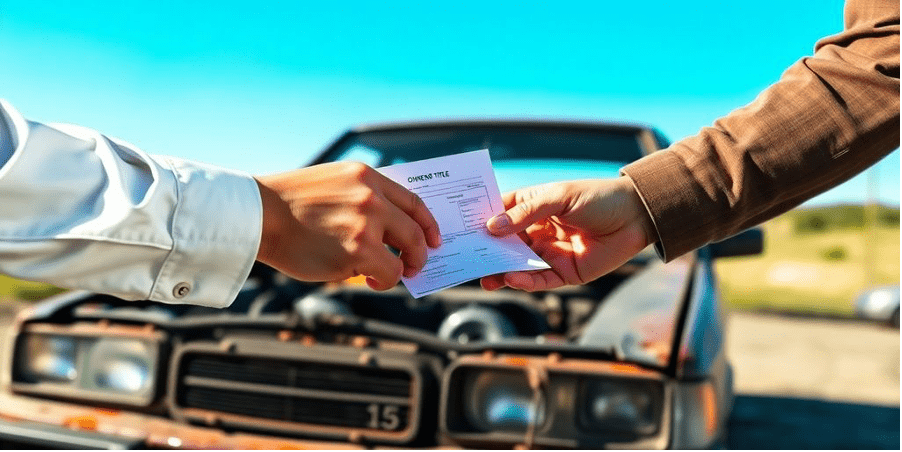Key Takeaways
- Always have the vehicle title ready before selling your junk car.
- Make sure to fill out the title accurately to avoid any delays.
- Notify the DMV about the sale to clear your name from future liabilities.
- Understand the process if you're selling a car without a title.
- Keep a copy of all documents related to the sale for your records.
Understanding the Importance of Title Transfers

Why Title Transfers Matter
When you're selling a junk car, the title transfer is more than just a piece of paperwork—it's your ticket to legally passing ownership. This document proves who owns the vehicle, and transferring it ensures that the new owner is officially recognized. Without this step, you could still be on the hook for any mishaps or fines related to the car, even after it's long gone. It's like selling a house but still being responsible for the property taxes. Nobody wants that hassle.
Legal Implications of Not Transferring
Skipping the title transfer can land you in hot water legally. Imagine a scenario where the car you sold is involved in an accident or used in a crime. If the title is still in your name, you might find yourself answering questions you don't want to. Plus, you could face fees or penalties from the state for failing to update the ownership records. It's a simple step that saves a lot of potential headaches.
Common Mistakes to Avoid
Even though it seems straightforward, there are a few common pitfalls when it comes to transferring a title. First, make sure all the information is accurate—misspellings or incorrect details can delay the process. Also, don't forget to remove your license plates before handing over the car. And lastly, always keep a copy of the signed title and bill of sale for your records. These documents are your proof that the sale was finalized, just in case something goes sideways later.
Preparing Your Junk Car for Sale
Gathering Necessary Documents
Before you even think about selling your junk car, gather all the required paperwork. This includes the car title, registration, and any other documents proving ownership. If you've misplaced your title, you might need to visit the DMV to get a duplicate. Be sure to check if there are any liens on the vehicle, as these must be resolved before you can sell it. Having all your paperwork in order speeds up the process and avoids any last-minute hiccups.
Inspecting and Cleaning the Vehicle
Even though it's a junk car, giving it a quick inspection and clean-up can make a difference. Start by removing all personal belongings, from keychains to bumper magnets. If your car has custom parts like rims or a stereo, consider selling these separately for a bit of extra cash. While the junkyard won't care about a bit of dirt, clearing out your stuff is a must. A clean slate makes it easier to sell your old junk car and ensures you don't leave anything behind.
Negotiating Pickup and Delivery
When it comes to getting your car to the junkyard, it's all about negotiation. Many junkyards offer free towing, so make sure this is included in your deal. If your car can still drive, you might be able to deliver it yourself and possibly get a better price. Just ensure that the path is clear for the tow truck, and there's nothing blocking the car's access. By planning the pickup or delivery ahead of time, you avoid any surprises and ensure a smooth handover.
Steps to Transfer Ownership of a Junk Car

Filling Out the Title Correctly
When you're ready to sell your junk car, the first step is filling out the title correctly. This involves writing down the buyer's name and address, the date of sale, and the odometer reading. Some states might require you to get your signature notarized, so check local rules. Accuracy is key here—any mistakes can stall the sale or lead to legal headaches.
Signing and Exchanging the Bill of Sale
Next, you'll need to sign and swap the bill of sale with the buyer. This document is crucial as it officially records the transaction details. Make sure both parties sign it and double-check that all information matches what's on the title. Each of you should keep a copy for your records. This step locks in the deal and formally transfers ownership to the buyer.
Notifying the DMV of the Sale
Finally, let the Department of Motor Vehicles (DMV) know about the sale. This is a must-do to update the state's records and clear your name from the vehicle's ownership. Depending on where you live, you might need to fill out a release of liability form or submit a copy of the bill of sale. It's a good idea to confirm with the buyer that they'll handle the title transfer with the DMV promptly.
Selling a car to a junkyard involves notifying the state of the change in ownership, similar to a private sale. The process includes gathering necessary documents, evaluating the car's condition, and negotiating a fair price with the junkyard. It's essential to understand the requirements and steps to ensure a smooth transaction.
By following these steps, you ensure a smooth transfer of ownership and protect yourself from any future liabilities related to the car. Always keep a paper trail of all documents and communications for your peace of mind.
Handling Special Cases in Title Transfers
Selling a Car Without a Title
Sometimes, you might find yourself wanting to sell a junk car that doesn’t have a title. This can happen if the car is very old or has been abandoned for some time. But don't worry, selling a car without a title is still possible in many states. Some states allow you to sell a junk car without a title as long as you can prove ownership through other means. These might include a bill of sale, registration paperwork, or even a notarized statement. It's a good idea to check with your buyer and the local DMV to understand the specific requirements for your situation.
Dealing with Liens on the Vehicle
If your junk car has a lien on it, selling it can be a bit tricky, but it's not impossible. First, you'll need to contact the lienholder to find out the payoff amount. Once you know this, you can decide whether it's worth paying off the lien before selling the car. Some buyers might be willing to work with you to pay off the lien as part of the purchase process. Keep in mind that the lien must be cleared before the title can be transferred to the new owner.
Alternative Proofs of Ownership
When a title isn't available, alternative proofs of ownership become important. These can include a previous bill of sale, old registration documents, or other paperwork proving your connection to the vehicle. In some situations, you might need to provide a notarized letter stating your ownership claim. Always ensure that whatever documentation you provide is acceptable to both the buyer and the DMV to avoid any legal issues.
Finalizing the Sale and Post-Sale Responsibilities
Verifying All Documents
Before you wrap up the sale, make sure all your paperwork is in order. Double-check that the car title, bill of sale, and any other relevant documents are accurate and up-to-date. This step is crucial to prevent any headaches down the road. If anything's missing or incorrect, now's the time to fix it. You don't want any surprises later.
Ensuring Buyer Completes Title Transfer
Once the sale is done, it's the buyer's job to get the title transferred to their name. However, don't just leave it to them and hope for the best. Follow up to confirm they've taken care of it. If they don't, you might still be on the hook for any issues that pop up with the car. A quick check-in can save you a lot of trouble.
Keeping Records of the Transaction
After everything's signed and sealed, keep copies of all the documents. Store them somewhere safe—maybe a fireproof box or a digital backup. This way, if any disputes arise later, you'll have proof of the transaction. It's like having a paper trail that says, “Hey, I did everything right!”
Selling a junk car isn't just about handing over the keys. It's about making sure everything is documented and squared away. This not only protects you legally but also gives you peace of mind knowing the sale was handled properly.
Tips for a Smooth Transaction
Double-Check All Information
Before handing over any documents, take a moment to double-check all the information. From the VIN number to the buyer’s details, everything should be spot on. Mistakes here can lead to headaches later, so it's worth the extra effort. Make sure the title is signed correctly, and all the necessary fields are filled out. A small error can turn into a big problem.
Communicate Clearly with the Buyer
Keep the lines of communication open with the buyer. Discuss all details, from the price to the pickup arrangements, to avoid misunderstandings. It helps to confirm everything in writing, even if it’s just a quick email or text. Clear communication ensures both parties are on the same page, reducing the chance of disputes.
Understand State-Specific Requirements
Every state has its own quirks when it comes to selling a car, especially a junk car. Check what’s needed in your state to make sure you’re compliant with local laws. This might include specific forms or notifications to the DMV. Being aware of these requirements can save you from unnecessary fines or legal issues later on.
Taking these steps not only simplifies the process but also provides peace of mind, knowing that the transaction is handled correctly from start to finish.
Conclusion
Selling a junk car might seem like a hassle, but once you get the hang of the steps, it's pretty straightforward. Just make sure you have all your paperwork ready, especially the title, because that's key to transferring ownership. If you don't have a title, check what other documents you might need. Remember to report the sale to the DMV to avoid any future headaches. It's all about making sure everything's done by the book so you can move on without any worries. So, gather your documents, follow the steps, and soon enough, you'll have one less thing to worry about and maybe a little extra cash in your pocket.
Frequently Asked Questions
What is the purpose of transferring a car title?
Transferring a car title officially changes the ownership from the seller to the buyer, which is important to avoid future responsibilities or legal issues related to the vehicle.
Can I sell my junk car if I don't have the title?
Yes, you can sell a junk car without a title, but you might need other proof like a bill of sale or registration. Check with your local DMV for specific rules.
What documents do I need to sell a junk car?
You'll generally need the car title, a bill of sale, and a valid ID. If the title is missing, other documents like registration might be needed.
How do I fill out the car title for sale?
To fill out the car title, include the buyer's name and address, the sale date, and the odometer reading. Make sure to follow any state-specific instructions.
Do I need to inform the DMV after selling my junk car?
Yes, it's important to notify the DMV about the sale to release yourself from any future liability related to the car.
What should I do if my state requires notarization for the sale?
If notarization is needed, you should visit a notary public with the buyer to sign the bill of sale and any other required documents.



